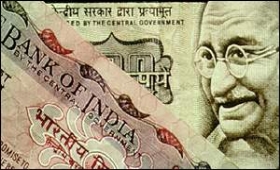|

|
Rollback of export sops - is the govt. justified?
|
|

|
|
| Top Stories |
 |
|
|
|
Bikky Khosla | 23 Sep, 2008
Come October, exporters will find themselves without the armour of export sops given last year to help tide over the sharp appreciation of the rupee.
This year's improvement in Indian exports - predominantly due to the depreciation of the rupee and exporters focusing on the various markets in Africa and Latin America - is the main cause for this decision to do away with the incentives.
The good news perhaps is that the way in which the rupee is moving vis-a-vis the dollar, in the next six months it will continue to be over 43 or 43.50 against the dollar. So exporters need not worry too much.
Having said that, sectors like textiles, leather, marine, agro & allied sectors, handicrafts, and sports goods, which are basically dependent on domestic inputs, haven't showed much growth. This was mainly due to an increase in raw material costs as well as recession in some of the major importing nations like the US and EU.
Textile exports have slowed down and if the current global situation persists, it will not be surprising if it is far lower this fiscal than last year's level of $ 21.46 billion.
However, conflicting reports are coming in about the withdrawal of the subvention of interest scheme. Exporters are also not sure whether service tax exemption to export-related services will continue or not. The ministry concerned should come up with a formal announcement on the details soon to lay these uncertainties to rest.
In all probability the interest rate subvention on pre and post-export credit as well as the 1-3 percent increase in duty drawback and duty entitlement pass book scheme (DEPB) rates will be rolled back to the values which they were at before the sops were announced.
However, while rolling back the subvention of interest scheme, the government must ensure that export credit in foreign currency is made available to all exporters, particularly to the MSME sector.
The government has already due to its inflation-control measures increased the prime lending rate (PLR) of banks. The PLR has gone up to as high as 16 percent. If export credit is given at 2.5 percent below the PLR, most exporters are actually getting it at 12 to 13.5 percent. I think at a time when our competing nations are getting export credit at less than 5 percent, such high interest rates would not be of help to the exporter.
However I get a feeling that both the Finance and the Commerce ministries are hastily jumping the gun to do away with the export sops. Everyone would agree that the depreciating rupee has not much benefitted exporters as they had covered their exposures in the forward market. The rupee has depreciated more than it was expected to and thus roll back of these sops will again affect them adversely.
Well, finding a rationale in the decisions of the government will perhaps be wasting our precious time. Instead we need to find solutions ourselves to beat the prevailing gloom in the economies of our key nations and move on.
|
|
|
| |
|
|
|
|
|
|
|
Violence and EU free trade agreement
Adrian Akau | Sat Sep 27 07:50:29 2008
"Recent violence is affecting free trade talks between the EU and India. Margot Wallstron, EU Commission Vice President has stated that violence against Christians was brought up earlier this year in talks between the EU and India on human rights. The Commission says it cannot agree with laws prohibiting Christianity in some parts of India and these laws are an issue that must be addressed. Last year, bilateral trade with the European Union amounted to 55.6 billion euros." It is my opinion that if the Central Government cannot resolve these on-going issues of continued violence, the free trade agreement discussions will be adversely affected. How can the EU respect a government that by inaction to its duty to rule, promotes beatings, killings and destruction of property. adrianakau2aol.com

Editorial is correct
S. A. Jayaraj | Fri Sep 26 07:38:03 2008
Yes, the editorial is correct in pointing out Indian exporters' struggles to survive in the export market with ever increasing price of all raw materials, increased cost of transportation and other service charges. And, the export market is narrowing due to the economic situation of our buyer countries. The Indian exporters are struggling to cope up with these hardships and in the meantime, Govt is all ready to stop all sops and drawback assistance saying that the situation has improved. you are correct in saying that we would be wasting our time in finding ways to rationalize the Govt actions and we have to find our own ways to overcome this crisis. Working more hard to find out more markets and more buyers is the only way for us.

|
|
|
|
|
|
|
| |
| Customs Exchange Rates |
| Currency |
Import |
Export |
US Dollar
|
66.20
|
64.50 |
UK Pound
|
87.50
|
84.65 |
Euro
|
78.25
|
75.65 |
| Japanese
Yen |
58.85 |
56.85 |
| As on 13 Aug, 2022 |
|
|
| Daily Poll |
 |
 |
| PM Modi's recent US visit to redefine India-US bilateral relations |
|
|
|
|
|
| Commented Stories |
 |
|
|
|
|
|
| |
|